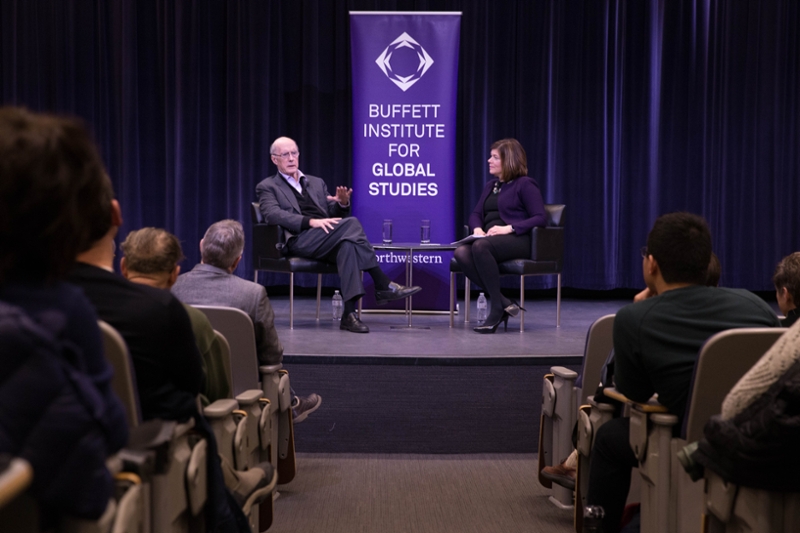Putting a "Premium on Civil Discourse"
Strobe Talbott, former head of Brookings, tackles how to merge scholarship and real-world policy
Get all our news
Universities are being tested as never before, and many question the Academy’s contribution to the public good”
Bruce Carruthers
Director of the Buffett Institute

Strobe Talbott, left, and Diane Whitmore Schanzenbach discussed the role of academia in public policy at a recent special lecture co-hosted by IPR and the Buffett Institute for Global Studies. (Photo by Michael Bacos)
For Strobe Talbott, a former journalist and State Department official who led one of the U.S.’ premier think tanks until last year, the lack of trust in expertise is “challenge number one, two, and three” for academics hoping their work can influence policymakers. Given this challenge, what role can academia play in policymaking, and how can academics best communicate their ideas to government leaders?
Talbott addressed this and other questions at a special lecture co-hosted by Northwestern University’s Institute for Policy Research (IPR) and the Buffett Institute for Global Studies on March 1.
The former Time magazine journalist is making a series of visits to the University this spring as part of the Buffett Institute’s Distinguished Visitors Program, designed to bring in prominent figures whose careers have involved them in top-level analysis and decision-making about global problems. Talbott is the first distinguished visitor.
“I can’t think of a more critical time in which to have this conversation,” said Bruce Carruthers, director of the Buffett Institute. “Universities are being tested as never before, and many question the Academy’s contribution to the public good.”
IPR Director and economist Diane Whitmore Schanzenbach moderated the discussion, interviewing Talbott about his experiences leading a think tank and abroad. Talbott, who led the Brookings Institute from 2002–17, discussed the broader role of think tanks in American government, as well as lessons learned from his time there.
“It’s an unfortunate phrase, ‘think tank,’” Talbott said. “We do like to think, and we like to think we are thinking rigorously and according to academic principles. But we also want to do things.”
The goal of think tanks, he continued, is to implement scholarly ideas that improve the world. Talbott and Schanzenbach agreed that the challenge comes in effectively communicating those ideas to policymakers and government leaders, particularly in a cultural moment when expertise and intellectualism are not valued. Schanzenbach said getting ideas into the conversation in Washington, D.C., is key.
“Our relative strength in the Academy is to work on very important questions and try to answer them as rigorously as we can, and then, if possible, try to design solutions and communicate them to policymakers,” Schanzenbach said after the event. “The last steps are currently not our strength in the Academy, but we’re getting better.”
But that communication is not a one-way street. Talbott encouraged those in government to reach out to universities to seek relevant policy research, too.
He also discussed the need for a variety of voices in our democracy. One of the driving philosophies at Brookings, Talbott said, is celebrating pluralism.
“We are not looking for reinforcing intellects, but critical intellects working together, as long as they observe and act upon the fundamental principles that a good university acts on,” Talbott said. “We have put a particular premium on civil discourse.”
Having served as U.S. Deputy Secretary of State from 1994–2001, Talbott, a Russian expert, also weighed in on America’s current foreign policy strategy, particularly the ongoing discussions about Russia. He said he met Vladimir Putin before he rose to power and offered his understanding of Putin’s intentions.
“He is deeply paranoid about the West,” Talbott said. “The West is in trouble—the political West—and he is going to do everything he can to make sure that it stays in trouble.”
He added the Academy can play a role in protecting the United States from Russian hacking.
“The work that is being done in universities around this country is absolutely invaluable if we are going to be able to deter some of the new technical challenges that are coming out of Russia,” Talbott said.
While praising American universities for being the best in the world, Talbott said he was optimistic about academia's future—especially when he interacts with students, like the Northwestern undergraduates he met in class.
“I’ve learned a lot listening to those students,” Talbott said. “I was getting them to educate me.”
Strobe Talbott is a Buffett Institute Distinguished Visitor, former president of the Brookings Institute, and former U.S. Deputy Secretary of State. Diane Whitmore Schanzenbach is the Margaret Walker Alexander Professor and IPR director.
Published: March 23, 2018.